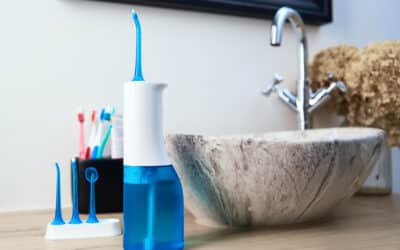Have you noticed white or yellow patches in your mouth when brushing your teeth? Have these patches been painful or bled? These are the symptoms of oral thrush, a fungal infection in the mouth.
How do you get oral thrush? How do you treat oral thrush? At Ohana Orthodontics, we can show you how to recognize the symptoms and treat and prevent such an infection. We can also explain why you might get this fungal infection.

What Is Oral Thrush?
What is oral thrush? It is a fungal infection, also called oral candidiasis or Oropharyngeal candidiasis, caused by a buildup of the candida albicans fungus. The fungus lives in your mouth naturally, but certain conditions or medications can cause the fungus to grow out of control. The fungus then forms patches in your mouth.
The patches may resemble cottage cheese. Older adults and people with weakened immune systems are at higher risk.
What Are the Signs and Symptoms of Oral Thrush?
Oral thrush in adults and oral thrush in children have similar symptoms. The symptoms include:
- White patches on the tongue, cheeks, gums, palate, or tonsils
- Soreness in the mouth
- Bleeding of the patches
- Dry mouth
- Trouble swallowing
- Loss of taste
- For infants, fussiness during feeding
Why Did I Get Oral Thrush?
The candida fungus is usually present in your mouth and throat. Your immune system keeps it to low enough levels that it doesn’t cause problems. When something compromises your immune response, the fungus grows out of control.
What can cause oral candidiasis? It’s caused by a weakened immune system as a result of:
- Diabetes
- Immunocompromising diseases such as HIV/AIDS
- Sexually transmitted infections
- Severe stress
- Cancer treatment
- Certain medications, such as antibiotics and corticosteroids
- Tobacco use
- Dry mouth
Your saliva helps keep the candida fungus in check. When you have a dry mouth, the lack of saliva can cause the fungus to grow out of control. If certain medications give you a dry mouth, talk with your doctor about changing the medication or dosage. There may be alternatives that you can use that won’t give you dry mouth.
Drink plenty of water to help prevent dry mouth. If you don’t wear braces, a sugar-free gum can stimulate saliva and help prevent dry mouth and the growth of the fungus.
Can Invisalign or Braces Cause Oral Thrush?
Invisalign can trap the fungus against your teeth and gums, causing it to grow. This can also happen for those who wear dentures.
It’s important to rinse your clear aligners each time you remove them from your mouth and before replacing them. You also need to clean your clear aligners regularly.
There is a lower chance of braces causing oral thrush, but it can happen. Braces can also irritate the white patches. Brush and floss regularly to prevent your braces and clear aligners from causing oral candidiasis.
Is Oral Thrush Contagious?
Oral thrush isn’t necessarily contagious, but it can be spread from a breastfeeding baby to the mother and then spread back to the baby. The mother and baby should be treated immediately to avoid continuous infection.
You can’t pass the fungus through the air like a virus, but you can pass it from person to person through saliva. Avoid the saliva of someone with oral thrush, especially if you have a compromised immune system. If you come in contact, brush your teeth immediately or rinse with warm salt water.
How to Get Rid of Oral Thrush
Your doctor will prescribe antifungal medicine to get rid of your oral candidiasis. This may come as mouthwash or lozenges. If those don’t work, your doctor may prescribe antifungals in pill form.
Certain medical conditions can make you prone to develop oral thrush.
You can also help treat your oral thrush at home. Rinse your mouth several times a day with warm salt water to reduce the fungus. You can also use apple cider vinegar or lemon juice for more home remedies to stop the fungus from growing out of control.
Brush your teeth thoroughly after every meal. Eat yogurt or cheese, which has enzymes that can restore balance to the amount of fungus in your mouth.
Does oral thrush go away on its own? Sometimes, depending on the extent of your infection. A mild infection may disappear on its own, but a severe infection likely will need antifungal medications.
How Do I Prevent Oral Thrush?
There are several ways to prevent oral thrush. Eat healthy to keep your immune system strong. Vitamins such as B and C and other supplements can help strengthen your immune system. Eat yogurt or cheese to maintain the fungal balance in your mouth.
Practice good oral hygiene to prevent an infection. Brush and floss your teeth regularly, cleaning your whole mouth, including the roof of your mouth and tongue. This includes brushing your teeth properly with braces. If you have finished being treated with antifungal medication, change your toothbrush so you don’t put the fungus back into your mouth.
Talk to your doctor about any medications that cause dry mouth. Your doctor may change your medication or recommend a mouth rinse that keeps your mouth moist and reduces the chance of the fungus growing.
Quit using tobacco products if you can. Your doctor may be able to help with that, too.
Clean your clear aligners or dentures by soaking them with cleaning tablets at least once a day. Rinse them each time you remove or replace them in your mouth.

Oral Thrush Treatment in Canby, OR
Oral thrush isn’t as serious as other mouth ailments like gum disease. However, it can make eating and drinking unpleasant and, in some cases, can be painful. The good news is that oral thrush is relatively easy to treat and prevent.
At Ohana Orthodontics, we recognize the symptoms of oral thrush. We examine you at each visit. If we see signs of oral thrush, we will start treatment right away and show you how you can prevent it in the future.




